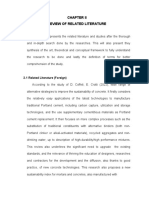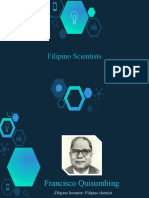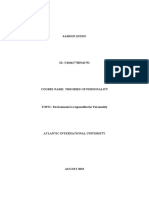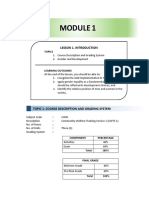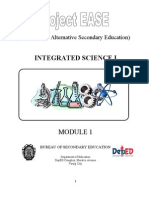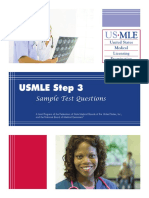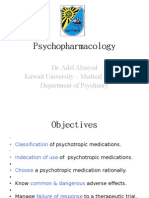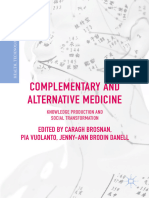0 ratings0% found this document useful (0 votes)
135 viewsPaulo C. Campos: (July 7, 1921 - June 2, 2007)
Paulo C. Campos: (July 7, 1921 - June 2, 2007)
Uploaded by
NancePaulo C. Campos was a Filipino physician noted for his promotion of community healthcare and his achievements in nuclear medicine. He established the first nuclear medicine laboratory and radioisotope laboratory in the Philippines. Campos conducted research on goiter and advocated for the treatment of goiter with iodized oil injections. He also established community health programs and served as an educator, founding medical schools and managing the Emilio Aguinaldo College of Medicine.
Copyright:
© All Rights Reserved
Available Formats
Download as DOCX, PDF, TXT or read online from Scribd
Paulo C. Campos: (July 7, 1921 - June 2, 2007)
Paulo C. Campos: (July 7, 1921 - June 2, 2007)
Uploaded by
Nance0 ratings0% found this document useful (0 votes)
135 views3 pagesPaulo C. Campos was a Filipino physician noted for his promotion of community healthcare and his achievements in nuclear medicine. He established the first nuclear medicine laboratory and radioisotope laboratory in the Philippines. Campos conducted research on goiter and advocated for the treatment of goiter with iodized oil injections. He also established community health programs and served as an educator, founding medical schools and managing the Emilio Aguinaldo College of Medicine.
Original Title
stsssssss
Copyright
© © All Rights Reserved
Available Formats
DOCX, PDF, TXT or read online from Scribd
Share this document
Did you find this document useful?
Is this content inappropriate?
Paulo C. Campos was a Filipino physician noted for his promotion of community healthcare and his achievements in nuclear medicine. He established the first nuclear medicine laboratory and radioisotope laboratory in the Philippines. Campos conducted research on goiter and advocated for the treatment of goiter with iodized oil injections. He also established community health programs and served as an educator, founding medical schools and managing the Emilio Aguinaldo College of Medicine.
Copyright:
© All Rights Reserved
Available Formats
Download as DOCX, PDF, TXT or read online from Scribd
Download as docx, pdf, or txt
0 ratings0% found this document useful (0 votes)
135 views3 pagesPaulo C. Campos: (July 7, 1921 - June 2, 2007)
Paulo C. Campos: (July 7, 1921 - June 2, 2007)
Uploaded by
NancePaulo C. Campos was a Filipino physician noted for his promotion of community healthcare and his achievements in nuclear medicine. He established the first nuclear medicine laboratory and radioisotope laboratory in the Philippines. Campos conducted research on goiter and advocated for the treatment of goiter with iodized oil injections. He also established community health programs and served as an educator, founding medical schools and managing the Emilio Aguinaldo College of Medicine.
Copyright:
© All Rights Reserved
Available Formats
Download as DOCX, PDF, TXT or read online from Scribd
Download as docx, pdf, or txt
You are on page 1of 3
Paulo C.
Campos
(July 7, 1921 – June 2, 2007)
Was a Filipino physician and educator noted for his promotion
of wider community health care and his achievements in the
field of nuclear medicine for which he was dubbed as "The
Father of Nuclear Medicine in the Philippines". The first
president of the National Academy of Science and Technology,
he was conferred the rank and title of National Scientist of the
Philippines in 1988.
Contributions to medicine
Throughout the 1950s, Campos would pursue graduate
studies in the United States; particularly at the Johns Hopkins
University School of Medicine, Harvard Medical School, and at
the Medical Division of the Oak Ridge Institute of Nuclear
Studies. He developed an interest in nuclear medicine while at
Johns Hopkins, and completed a training course on the field at
Oak Ridge.
As head of the Department of Medicine, Campos established
the first Medical Research Laboratory in the Philippines at the
U.P. College of Medicine.
Nuclear medicine
Campos initiated the construction of the first
[radionuclide|radioisotope] laboratory in the Philippines. With
funding provided by the International Atomic Energy Authority
and other Philippine institutions, the laboratory was established
at the Philippine General Hospital. As a result, it was made
possible for the first time in the country to conduct such
procedures as the basal metabolism test and radioactive iodine
therapy At the clinic, and with funding from the IAEA and later,
the World Health Organization, Campos conducted considerable
research on goiter, a common medical problem in the
Philippines. His team first suggested the injection of iodized oil
(see poppyseed oil) to goiter patients, a treatment later
advocated by the WHO.
Community medical outreach
As chairman of the Department of Medicine, Campos
began the practice of fielding medical interns for community
service in Los Baños, Laguna for one month a year. In 1963, the
program was institutionalized through the organization of the
Comprehensive Community Health Program (CCHP), pursuant
to an agreement between the University of the Philippines and
the Department of Health. The CCHP, which was based in Bay,
Laguna, served as a community health center that serviced
several towns in Laguna. Until its closure in 1989, it became the
community laboratory of the UP College of Medicine, and it was
there that Campos conducted testing on the use of iodized oil
for the treatment of goiter.
Educator
In addition to his service at the University of the
Philippines, Campos was also affiliated with the Emilio
Aguinaldo College of Medicine, which he and his family also
managed. Appointed as the president of the college in 1973, he
oversaw the establishment in 1977 of a second campus in
Dasmariñas, Cavite. The ownership and management of the
Dasmariñas campus was sold by the Campos family in 1987 to
the De La Salle University, which integrated it into the La Salle
system as what is now known as the De La Salle University-
Dasmariñas. The Campos family retained control over the
Manila campus of what is now the Emilio Aguinaldo College, a
partner-institution of the Medical Center Manila.
You might also like
- Med Surg Final Exam Question BankDocument16 pagesMed Surg Final Exam Question Bankamelis100% (4)
- Pediatrics Bradley 2020 PDFDocument498 pagesPediatrics Bradley 2020 PDFLiz Mtz100% (7)
- M08 Mari2603 07 Se C08Document7 pagesM08 Mari2603 07 Se C08LENARD GUINSATAONo ratings yet
- MMW Oralexamination ReviewerDocument5 pagesMMW Oralexamination ReviewerZenetib YdujNo ratings yet
- Paulo CamposDocument2 pagesPaulo CamposTyron ChuaNo ratings yet
- Science Education in Philippine SocietyDocument4 pagesScience Education in Philippine SocietyCharisse VisteNo ratings yet
- Reviewer For Sts Chapter 9Document4 pagesReviewer For Sts Chapter 9Belle MendozaNo ratings yet
- National Scientists of Los BanosDocument14 pagesNational Scientists of Los BanosJanis Ian DelfinoNo ratings yet
- Senior High School: Emilio Aguinaldo College City of Dasmariñas, CaviteDocument7 pagesSenior High School: Emilio Aguinaldo College City of Dasmariñas, CaviteNicole De AsisNo ratings yet
- Sample Psychotherapy NoteDocument2 pagesSample Psychotherapy NoteRafael Sanchez100% (3)
- Activity 3 (STS)Document6 pagesActivity 3 (STS)Lumbay, Kevin D.No ratings yet
- Role of Physics in The SocietyDocument2 pagesRole of Physics in The SocietyKumar Sunar100% (1)
- Concept PaperDocument3 pagesConcept Papercharles estradaNo ratings yet
- Chapter 2 PRDocument8 pagesChapter 2 PRKatsuki HashimotoNo ratings yet
- CHAPTER-3 EditedDocument28 pagesCHAPTER-3 EditedMichael Pogi RodriguezNo ratings yet
- Efficacy of DUMBCANE (Dieffenbachia Picta Schott.) Stem Extracts AGAINST GOLDEN APPLE SNAIL (Pomacea Canaliculata L.)Document3 pagesEfficacy of DUMBCANE (Dieffenbachia Picta Schott.) Stem Extracts AGAINST GOLDEN APPLE SNAIL (Pomacea Canaliculata L.)Mary rose YenyenNo ratings yet
- Anaphy TransesDocument5 pagesAnaphy TransesScyrah Allana RiegoNo ratings yet
- Group-8 Filipino-ScientistsDocument11 pagesGroup-8 Filipino-ScientistsAljondear RamosNo ratings yet
- Theories of Personality Essay-44318109Document15 pagesTheories of Personality Essay-44318109irena34No ratings yet
- Module 2 Section 1 Lecture SlidesDocument35 pagesModule 2 Section 1 Lecture SlidesJewela NogasNo ratings yet
- Ethical Issues in Science and TechnologyDocument6 pagesEthical Issues in Science and TechnologymarializasurioNo ratings yet
- Unit 3 STSDocument52 pagesUnit 3 STSIsaac DanggoNo ratings yet
- CHAPTER 2 The Environment OrganismsDocument7 pagesCHAPTER 2 The Environment Organismsecnalyerdna werpaNo ratings yet
- Scientific Paper: Department of EducationDocument14 pagesScientific Paper: Department of EducationThe Gaile-squared ShopNo ratings yet
- According To Popova That Discussed Victor FranklDocument1 pageAccording To Popova That Discussed Victor FranklJan Edzel Batilo IsalesNo ratings yet
- Utilitarianism, Is An Ethical Theory That Argues For The Goodness of Pleasure andDocument11 pagesUtilitarianism, Is An Ethical Theory That Argues For The Goodness of Pleasure andJoanna Jauculan AlbañoNo ratings yet
- Activity-Sts Tani Kimberly ClaireDocument11 pagesActivity-Sts Tani Kimberly ClaireKim TaniNo ratings yet
- Group 4 Teacher'sDocument4 pagesGroup 4 Teacher'sAdrian GabrielNo ratings yet
- Narrative (Group 3)Document9 pagesNarrative (Group 3)Jahn Cyren G. TibayanNo ratings yet
- The Impact of Science and Technology in The Philippines StsDocument9 pagesThe Impact of Science and Technology in The Philippines StsJay Dee RiñonNo ratings yet
- STS Module 4Document15 pagesSTS Module 4Zachary Yassir GonzalezNo ratings yet
- Chapter 1Document5 pagesChapter 1nina grace joy100% (1)
- Superdupermega Final PDFDocument48 pagesSuperdupermega Final PDFDominique LopenaNo ratings yet
- Group 4 - The "No Self Theory"Document9 pagesGroup 4 - The "No Self Theory"Rey Vincent RodriguezNo ratings yet
- 1.the Science of EcologyDocument15 pages1.the Science of EcologyMerlito Fancubila Flagne Jr.No ratings yet
- Lab Report 3.egg DropDocument3 pagesLab Report 3.egg Dropshaina angela SierasNo ratings yet
- Gene Therapy InfoDocument3 pagesGene Therapy InfoShailendra Singh KhichiNo ratings yet
- Gen Biology Module Lesson 2&3Document13 pagesGen Biology Module Lesson 2&3Albert Jade Pontimayor LegariaNo ratings yet
- TFN I and IIDocument3 pagesTFN I and IISILEC,Hezir Lee H.No ratings yet
- Module I Unit3Document20 pagesModule I Unit3Trixie AdamNo ratings yet
- Hay InfusionDocument5 pagesHay InfusionVeronica ZabalaNo ratings yet
- Article Abt Talaba of Pagsanghan - Malvin VelardoDocument1 pageArticle Abt Talaba of Pagsanghan - Malvin VelardoDane MorrisNo ratings yet
- Module CWTS First SemDocument82 pagesModule CWTS First SemKim NaheeNo ratings yet
- Readings in Philippine HistoryDocument3 pagesReadings in Philippine HistoryChristine Mae MartosNo ratings yet
- Experiment No.1: Osmosis and Diffusion: Pisan, Marrie Kris Saguid, Reinah Lyn Versoza, Jasmine NikkiDocument7 pagesExperiment No.1: Osmosis and Diffusion: Pisan, Marrie Kris Saguid, Reinah Lyn Versoza, Jasmine NikkiMage San LuisNo ratings yet
- FinalnatopaperDocument51 pagesFinalnatopaperNeirish fainsanNo ratings yet
- Rhadzx Final IIIDocument24 pagesRhadzx Final IIIJohn Enrick ManuelNo ratings yet
- Understanding Climate Factors and Impacts in Abuyog, Leyte: A Correlational and Trend Analysis (2010-2020)Document11 pagesUnderstanding Climate Factors and Impacts in Abuyog, Leyte: A Correlational and Trend Analysis (2010-2020)nathanandrieama100% (1)
- Bubbles Lab ReportDocument8 pagesBubbles Lab ReportARNI SENGUPTA100% (1)
- Nutrients of LumpiaDocument3 pagesNutrients of LumpiaBevelyn NaulNo ratings yet
- Historical Antecedents in The PhilippinesDocument22 pagesHistorical Antecedents in The PhilippinesErika Mae LegaspiNo ratings yet
- FINALDocument44 pagesFINALKaye EstrellaNo ratings yet
- Module 3 Lesson 2 Edited For CBL Lesson ContentDocument8 pagesModule 3 Lesson 2 Edited For CBL Lesson ContentMariecris BatasNo ratings yet
- Chapter Viii: The Nano WorldDocument2 pagesChapter Viii: The Nano WorldCherry Ann OlasimanNo ratings yet
- PE NotesDocument20 pagesPE NotesAlma C WalshNo ratings yet
- The Health Benefits of Playing BasketballDocument1 pageThe Health Benefits of Playing BasketballMark Luigie CalanogNo ratings yet
- Local Media5766598185496389114Document7 pagesLocal Media5766598185496389114Zoey LedesmaNo ratings yet
- Module 1 What Is ScienceDocument24 pagesModule 1 What Is ScienceYantiSulaiman100% (1)
- The Philippines A Unique NationDocument4 pagesThe Philippines A Unique NationMineski B. Dota100% (7)
- General CM CatalogueDocument56 pagesGeneral CM CatalogueJonathan ChanNo ratings yet
- College of Medicine PDFDocument83 pagesCollege of Medicine PDFAlyssa BautistaNo ratings yet
- 2 - Reviewer For PMLS1Document2 pages2 - Reviewer For PMLS1Mazon, Dinah Melisse P.No ratings yet
- 6378 The University of The Philippines College of Medicine Pioneer in Medical Education Innovations in The PhilippinesDocument6 pages6378 The University of The Philippines College of Medicine Pioneer in Medical Education Innovations in The PhilippinesAldan Rae TuboNo ratings yet
- 6th Edition Essentials ATS IFSTA Correlation GuideDocument3 pages6th Edition Essentials ATS IFSTA Correlation GuideBomberos PoncitlanNo ratings yet
- DistrictempanelledhospDocument14 pagesDistrictempanelledhospSumit SinghalNo ratings yet
- Reading Sample 6 DVTDocument19 pagesReading Sample 6 DVTdrMinuNo ratings yet
- Katalog Produk Luar Negeri (Akl) Luar NegeriDocument6 pagesKatalog Produk Luar Negeri (Akl) Luar Negerifandi dwi setyokoNo ratings yet
- Kalpataru - The Wishing TreeDocument1 pageKalpataru - The Wishing TreeTom DorjeNo ratings yet
- Tddler Assessment: College of NursingDocument34 pagesTddler Assessment: College of NursingJeMalyn VieRnesNo ratings yet
- New Outfits - Bio-OutfitsDocument2 pagesNew Outfits - Bio-Outfitserasedata232No ratings yet
- GSL BMW ApplDocument6 pagesGSL BMW ApplNANIBABUNo ratings yet
- Cancers 12 00584 v2Document14 pagesCancers 12 00584 v2nisha justinNo ratings yet
- Revisi SOHO Slide Quetiapine XR For Bipolar & SchizophreniaDocument25 pagesRevisi SOHO Slide Quetiapine XR For Bipolar & Schizophreniaayesha devinaNo ratings yet
- Step 3 Sample Questions 2015Document41 pagesStep 3 Sample Questions 2015yepherenow100% (2)
- The Nervous SystemDocument5 pagesThe Nervous SystemArif QadhafyNo ratings yet
- Dictionary of OrganonDocument281 pagesDictionary of OrganonFazal Akhtar100% (1)
- Get Western Biomedicine and Eastern Therapeutics An Integrative Strategy for Personalized and Preventive Healthcare 1st Edition Sun-Chong Wang free all chaptersDocument51 pagesGet Western Biomedicine and Eastern Therapeutics An Integrative Strategy for Personalized and Preventive Healthcare 1st Edition Sun-Chong Wang free all chapterssuragmayumy100% (4)
- Formulasi Dan Uji Antijerawat Gel Ekstrak Etanol 70% Buah BelimbingWuluh (Averrhoa Bilimbi Linn.) Terhadap Bakteri Propionibacterium AcnesDocument11 pagesFormulasi Dan Uji Antijerawat Gel Ekstrak Etanol 70% Buah BelimbingWuluh (Averrhoa Bilimbi Linn.) Terhadap Bakteri Propionibacterium AcnesEgg TelorNo ratings yet
- Adv. Biopharmaceutics All For VIvaDocument98 pagesAdv. Biopharmaceutics All For VIvaArvi KhanNo ratings yet
- RUC PA White Coat Ceremony Program - 2020Document2 pagesRUC PA White Coat Ceremony Program - 2020Frank ClarkNo ratings yet
- Rare 23 Papers of 2014-2015 Not in 42 Files (Golden) & Chandkians-6th by Amlodipine BesylateDocument256 pagesRare 23 Papers of 2014-2015 Not in 42 Files (Golden) & Chandkians-6th by Amlodipine BesylateAmlodipine BesylateNo ratings yet
- PsychopharmacologyDocument50 pagesPsychopharmacologyapi-3703352No ratings yet
- Anesthesia Post OP OrdersDocument6 pagesAnesthesia Post OP OrdersFaye TinimbangNo ratings yet
- Sets, Relations and FunctionsDocument18 pagesSets, Relations and FunctionsVaishali BalajiNo ratings yet
- Impacts of It On OrganizationsDocument16 pagesImpacts of It On OrganizationsogakhanNo ratings yet
- Blood Donation Best PracticesDocument18 pagesBlood Donation Best PracticesMaria Lea SerranoNo ratings yet
- CS-400 CS 4 C 3 MayDocument1 pageCS-400 CS 4 C 3 MayIsHa KhAnNo ratings yet
- Complementary and Alternative Medicine (Caragh Brosnan, Pia Vuolanto Etc.)Document343 pagesComplementary and Alternative Medicine (Caragh Brosnan, Pia Vuolanto Etc.)lilahgreenyNo ratings yet
- The Role of The Pharmacist in The Health Care SystemDocument6 pagesThe Role of The Pharmacist in The Health Care SystemZain AlviNo ratings yet
- CM Lecture NotesDocument30 pagesCM Lecture NotesJefferson SorianoNo ratings yet













